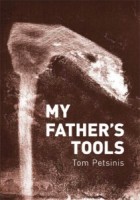 My Father’s Tools by Tom Petsinis
My Father’s Tools by Tom Petsinis
Australian Scholarly Publishing, 2009
I chose to review this book wondering how a poet could possibly shape poetic imagery from mundane work tools. Also aware of the multicultural background of Tom Petsinis’ work, I wondered whether he was able to forge something new from well-known and perhaps stereotypic perspectives of the migration experience. On both counts I found my reservations unreasonable, delighted with the beauty and originality of a collection of poems primarily centred on memories of the poet’s father that also depict wonderful metaphoric images of the poetic stimulus, as in the poem ‘The Doorknob’: “A token stripped of past, ripe with purpose,/Replete with future, new meaning, verse.”
The poems pivot around various work tools, forty-seven in all, which have remained in the Petsinis family household since the poet’s father’s death. Petsinis resurrects his father’s rusted work tools into the tools of a skilled wordsmith. Throughout the collection, he associates his father’s creativity with the work tools with his own creativity with words. For instance he refers to a builder’s pencil worn behind his father’s ear, and mentions that a lifetime later he is drafting the poem with the same pencil on concrete. Similarly a horseshoe serves as a dead weight, on his desk, restraining unpublished poems from following him.
This unique association with work tools also serves to acknowledge the generational indebtedness a son feels for the hardships experienced by his immigrant father born in a village in the Macedonia region of northern Greece. Petsinis migrated with his father to Melbourne in 1959 aged six. In ‘Gumboots’ he describes how his father worked in a cannery and when the cannery closed he was sent home with “white overalls, matching caps, oversized boots, / And a letter of reference you couldn’t read.” These poems serve as a tribute to Petsinis’ father; as he tells his father in ‘Horseshoe’: “I’m racing towards you, redeeming your luck.”
There is sensuousness about the poems that physically relate father to son. ‘Ruler’ measures the son’s growth; father’s hand is visualised as he rummages through a tin of nails; the adult son feels the impression of his father’s soles when wearing his gumboots. Through the physicality of his poems, Petsinis subtlety interweaves historical and generational references. He refers to “the swirl of my finger prints merging with yours”, when examining a level with his seven year-old daughter. In ‘Bolts’ he refers to his mother’s pickling jar that became a repository for “preserving this collection of assorted bolts.” The sickle “used to cut my umbilical cord”, reminds him of “Mum, recently gone, / Labouring for each breath in her dying pain.” A somewhat disturbing yet empathic poem, ‘Poker’ recalls the pain of being burnt on the calves. As an adult, Petsinis questions her pain and wonders whether her punishing act arose from “Guilt at leaving her own mother overseas.”
And herein is the beauty and uniqueness of these sharp-edged and polished poems, succinct in imagery that hints at the dispossession of lives marred, yet enhanced, by the process of migration. As depicted in ‘Plough’:
Scattered by migration like grains of wheat,
Your generation, now withering in nursing homes,
The last to be intimate with mother earth.
The poems remind me of the sadness I feel when seeing aged immigrant men congregate, one by one, in a corner of the Yiannis cake shop near the front window overlooking Sydney road in Melbourne. The men pull out the chairs from the tables and gradually form a circle facing each other. Some twirl their worry beads. They are served their thick coffee brew and a glass of water, and discuss politics and village life. Do they talk about death, I wonder? Perhaps they talk with regret about the prospect of dying in urban Australia away from their villages of birth. Petsinis refers to the “padded shoulders” presumably of the pallbearers at his father’s funeral in ‘Level’. In the village the gravediggers and pallbearers would be kinsfolk and neighbours. The collection e closes with ‘Barrel’, a poem that includes a salutation: “Here’s to you father, and a generation gone.”
Two of the longer poems, ‘Knife’ and ‘Adze’, weave through the themes of life pre and post migration of the past generation. ‘Knife’ captures the bloodied history of the region of Macedonia and invasion by the Germans when Petsinis’ father was twenty years old:
You were twenty when the Germans struck,
Surrounding the village with two-edged shtiks,
Prodding you to fields sown with mines,Herding you into basement and barn,
Stropping their will on your leathery tongue,
Until the two-faced liberator cameAnd unleashed five years of Civil war
That tore the child from its mother’s breast
Flame from wick, prayer from hope.
The cover of this rust coloured publication, illustrated by Jim Pavlidis, features a drawing of an adze, a tool for cutting away the surface of wood. The poem of the same name consists of nine parts, each of five three-lined stanzas portraying village life; the social and economic factors that contributed to migration from the country of birth; and life in inner working class Melbourne:
Working weekends, overtime,
There was no place for this village tool
On a city’s construction site…A foreigner, refusing to assimilate,
To yield even to translation,
This adze has paid for its defiance
Soon, however, the adze becomes a potent metaphor, something to “Tap letters onto empty space, / Shape old words to something new?” Certainly the beauty of the poems in My Father’s Tools comes from the originality with which Petsinis utilises the experience of migration to create “something new”. These are universal poems, steering clear of crass sentimentality and parochialism.
Loula Rodopoulos was shortlisted in the 2010 All Poetry Competition.













